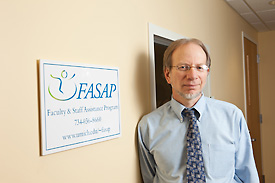For more information:
• Contact the Faculty and Staff Assistance Program by phone at 734-936-8660, by fax at 734-936-8893 or via e-mail at [email protected]
• Contact the U-M Health System Employee Assistance Program by phone at 734-763-5409 or via e-mail at [email protected]
If you’re troubled about a family, job or personal concern and have considered counseling, you’re not alone. Last year about 600 individuals received help through the Faculty and Staff Assistance Program, which serves the main campus, and hundreds more have called with questions about the program, says Director Thomas Waldecker.
“Folks come to us with issues regarding their family, grief and loss, problems with their parents or dealing with their children, or marital/partner concerns — what I often refer to as issues with daily living. It doesn’t have to be a crisis situation. They may just be having trouble making a decision,” he says.
Similarly, counseling is available to U-M Health System faculty and staff through the UMHS Employee Assistance Program. “A goal of the EAP is to assist each client in reducing suffering, recognizing their strengths and the resiliency that resides within them,” says Kathleen Robertson, EAP Program Manager. She says the EAP reaches more than 1,500 employees and family members in one-on-one settings annually, in addition to numerous group and educational interventions.
“Caregiving is a magnificent calling, but the cost to healthcare professional can be high if they are unable to find ways to sustain and renew themselves as they encounter patient suffering, loss, and family grief on a regular basis,” Robertson says. The UMHS EAP is well versed in the issues encountered in a healthcare setting, including job burnout, compassion fatigue and the unique stressors of everyday work.

Thomas Waldecker, director of the Faculty and Staff Assistance Program serving the main campus, and U-M Health System Employee Assistance Program Manager Kathleen Robertson (not pictured), offer counseling services to the greater U-M community. Photo by Austin Thomason, U-M Photo Services.
For both programs, faculty and staff can make an initial appointment over the phone or via e-mail. Appointments are roughly one hour and offered from 8 a.m.-5 p.m. Monday through Friday. The FASAP office, located in the Administrative Services Building on Greene Street near the football stadium, is open on Mondays until 6 p.m. UMHS EAP sessions take place in the Medical Professional Building, and may take place at off-site locations.
“When a person comes in we try to ascertain their concern, where they’re coming from, what it is they’re after,” Waldecker says. A counselor begins by asking about the person’s family and social history. “We’d ask some questions about how long this concern has been there. We’d ask some questions around relationships with others and how that affects them; we do a good thorough evaluation.”
Counselors try to present some options to consider: self help tools, and some educational tools they can explore on their own. People are given some some alternatives, such as stress management techniques and communication skills so they can learn to respond rather than impulsively react.
FASAP and UMHS EAP clients are seen for up to five sessions per concern. If the client requires further counseling, the counselor will connect them to treatment providers in the community, or those offered through the employee’s insurance provider.
Robertson says counselors assist clients in working through the issues they’re encountering and provide them with resources they need. “We are counselors, coaches, facilitators and witnesses to life,” she says. “We recognize that while stress and suffering may be universal, each person has a unique story, and counseling and coaching is an opportunity to tell that story and have it heard. It is a safe space to laugh, cry and explore hopes, fears and dreams. It is a place for internal reflection and a place to heal.”
All counseling is no-cost and confidential, with no record of counseling kept in the employee’s personnel file. Waldecker says FASAP clients can get in within a couple days of their first phone call or e-mail request for counseling. Many often make appointments on their lunch hours. The same is true for the UMHS EAP, where clients often will be able to get an appointment in less than 24 hours.
Beyond the typical one-on-one counseling, both programs also offer other related services. These include a FASAP Parenting Teenagers six-week class, which they hold twice each year, a managing anger series, and a stress management series. The UMHS EAP also offers a stress management and anger management series. Additionally, UMHS EAP designs team interventions to foster positive emotions, build trust, develop high quality relationships and promote conflict resolution.
“I want faculty and staff to experience us as a safe haven — a place to pause and reflect,” Robertson says. “Together, with our clients, we tap into each person’s innate wisdom, joy, forgiveness, curiosity and compassion to assist them in resolving whatever is troubling them.”

